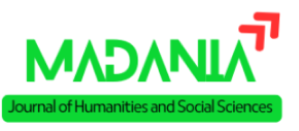Persaingan Politik dan Anggaran Kesehatan: Telaah Nilai Keadilan Distribusi dalam Ekonomi Islam
DOI:
https://doi.org/10.59240/kjsk.v5i1.160Keywords:
Health Budget, Political Economy, Regional Economic CompetitionAbstract
The purpose of the study is to understand the influence of political economy competition on government health budget allocation in Indonesia and the relationship between the influence of political economy competition on the health budget with the Islamic Economic Perspective. The Indonesian Democracy Index (IDI), Population Growth (PP), and poverty rate are the variables used. Panel data regression analysis with Random Effect (REM) model is the research method. The findings show that intensified political competition negatively affects health budget allocation, with a coefficient value of -0.033 on the IDI variable and -0.014 on the PP variable. Meanwhile, poverty level has a positive influence on health budget with a coefficient of 0.195. The Chow test shows a probability value of 4.656e-127, which indicates that the model fit is Random Effect. The Hausman test results show a probability value of 0.188, which supports the selection of the Random Effect model. In addition, the Breusch-Pagan value of 805,833 is shown in the Lagrange Multiplier (LM) test, with a probability of 0.000, which also indicates that the appropriate model is Random Effect. The implications of this study show the importance of more equitable policies in health budget allocation, by giving more attention to poor regions and reducing the impact of imperfect political competition.
References
Basuki, Agus Tri & Nano Prawoto. Analisis Data Panel Dalam Penelitian Ekonomi Dan Bisnis. Depok: RajaGrafindo, 2023.
Caplan, Bryan. “Has Leviathan Been Bound? A Theory of Imperfectly Constrained Government with Evidence from the States.” Southern Economic Journal 67, no. 4 (2001): 825–47. https://doi.org/10.1002/j.2325-8012.2001.tb00376.x.
Fakrurradhi, Fakrurradhi. “Prinsip-Prinsip Ekonomi Islam Dalam Al-Qur`An Menurut Tafsir Ibnu Katsir.” Al Mashaadir : Jurnal Ilmu Syariah 2, no. 2 (2022): 1–15. https://doi.org/10.52029/jis.v2i2.55.
Fatriani, Rakhmania Rifinesha, Maria Maria, and Darul Amri. “Pengaruh Politik, Perencanaan Anggaran, Dan Fiscal Stress Terhadap Perubahan Anggaran.” Kompeten: Jurnal Ilmiah Ekonomi Dan Bisnis 2, no. 2 (2023): 473–81. https://doi.org/10.57141/kompeten.v2i2.68.
Fiskal, Badan Kebijakan. “Laporan Kinerja Badan Kebijakan Fiskal 2024.” Transformasi Keuangan Menuju Pembangunan Yang Inklusif Dan Berkelanjutan. Jakarta: Kementerian Keuangan Republik Indonesia, 2024. https://fiskal.kemenkeu.go.id/files/lain-lain/file/LAKIN%20BKF%202024.pdf.
Gleeson, Deborah, Belinda Townsend, Brigitte F. Tenni, and Tarryn Phillips. “Global Inequities in Access to COVID-19 Health Products and Technologies: A Political Economy Analysis.” Health and Place 83, no. May (2023): 103051. https://doi.org/10.1016/j.healthplace.2023.103051.
Gujarati, N Damodar dan Porter, C Dawn. Dasar - Dasar Ekonometrika. 5th ed. Jakarta: Penerbit Salemba Empat, 2013.
Hayyu Wibhawa, Hammam Satmaka, Rusdianto, and Dewi Amalia. “Fenomena Politik Anggaran Menjelang Pemilukada Pada Daerah Petahana Di Indonesia.” Jurnal Akuntansi AKUNESA 11, no. 3 SE- (2023): 217–31.
Insany, Muhammad Alif Al, and R. Moh Qudsi Fauzi. “Konsep Ekonomi Politik Dalam Perspektif Ibnu Khaldun.” Jurnal Ekonomi Syariah Teori Dan Terapan 6, no. 1 (2019): 154–69. https://doi.org/10.20473/vol6iss20191pp154-169.
James, Caporaso. Teori Teori Ekonomi Politik. Ketiga. Yogyakarta: Pustaka Pelajar, 2022.
Khaldun, Ibnu. Muqodimah.Pdf. Jakarta: Pustaka Firdaus, 1986.
Lativa, Lativa, Sutiman Sutiman, and Rudi Sanjaya. “Pengaruh Ketidakseimbangan Realisasi Anggaran Terhadap Kinerja Instansi Pemerintah (Studi Kasus Pada Direktorat Jenderal Kesehatan Masyarakat Pada Kementerian Kesehatan Republik Indonesia).” Jurnal SEKURITAS (Saham, Ekonomi, Keuangan Dan Investasi) 7, no. 1 (September 24, 2023): 17–31-17–31. https://doi.org/10.32493/skt.v7i1.29746.
Mohammad Kamal Reza, Nurmalasari, and Sri Dewi Ayu Safitri. “Pengaruh Alokasi Anggaran Pemerintah Pada Sektor Kesehatan Terhadap Tingkat Kesejahteraan Kesehatan.” Jurnal Ilmiah Manajemen, Ekonomi Dan Akuntansi 2, no. 2 (2022): 48–56. https://doi.org/10.55606/jurimea.v2i2.150.
Qardhawi Yusuf. Peran Nilai Dan Moral Ekonomi Islam. Surabaya: Risalah Gusti, 1999.
Rasyid, Muhammad Rizki Hamdani, and Mike Triani. “Pengaruh Pengeluaran Pemerintah Di Sektor Kesehatan, Pendidikan Dan Tingkat Partisipasi Angkatan Kerja Terhadap Tingkat Kemiskinan Di Kabupaten/Kota Provinsi Sumatera Barat.” Media Riset Ekonomi Pembangunan (MedREP) 1, no. 2 (June 28, 2024): 163–71.
Runtiningsih, Sri, and Akhmad Akbar Susamto. “Pengaruh Persaingan Politik Terhadap Anggaran Kesehatan: Studi Kasus Pada Kabupaten Dan Kota Di Indonesia.” Jurnal Ekonomi Dan Pembangunan Indonesia 24, no. 1 (2024): 79–92. https://doi.org/10.21002/jepi.2024.05.
Sarjito, Aris. “Dampak Kemiskinan Terhadap Akses Pelayanan Kesehatan Di Indonesia.” Jurnal Ilmu Sosial, Politik, Dan Pemerintahan 13, no. 1 (2024): 397–416.
Tage, Petrus Kanisius Siga. “Politik Perang Dan Perampasan Anggaran Sektor Kesehatan.” Jurnal Penelitian Politik 17, no. 1 (2020): 31–58.
Wang, Yamei, Xiuquan Huang, Tao Zhang, Bo Jiang, and Xi Wang. “Impact of Fiscal Decentralization and Local Government Competition on the Supply of Basic Public Services: Based on the Empirical Evidence of Prefecture-Level Cities in China.” Heliyon 10, no. 4 (2024): e26511. https://doi.org/10.1016/j.heliyon.2024.e26511.
Yuliani, Devi, and Suhana Suhana. “Pengaruh Kepemimpinan Dan Keadilan Organisasi Terhadap Komitmen Organisasi.” Jesya 6, no. 1 (2023): 61–78. https://doi.org/10.36778/jesya.v6i1.839.
Yustika, Ahmad Erani. Ekonomi Politik. Jawa Timur: Intrans Publishing, 2020.
Downloads
Published
How to Cite
Issue
Section
License
Copyright (c) 2025 Siti Inayah, Evi Ekawati, Diah Mukminatul Hasimi

This work is licensed under a Creative Commons Attribution-NonCommercial-ShareAlike 4.0 International License.






